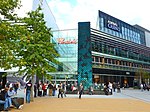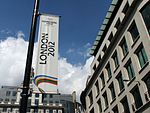East Village, London
2012 Summer OlympicsAreas of LondonBuildings and structures in the London Borough of NewhamHousing estates in LondonOlympic Villages ... and 6 more
Privately owned public spacesQueen Elizabeth Olympic ParkRedevelopment projects in LondonResidential buildings completed in 2012Stratford, LondonUse British English from October 2012

East Village is a housing development in Stratford, East London that was designed and constructed as the Olympic Village of the 2012 Summer Olympics and has been converted for use as a new residential district, complete with independent shops, bars and restaurants. The area was formerly contaminated waste land and industrial buildings to the north of Stratford town centre.
Excerpt from the Wikipedia article East Village, London (License: CC BY-SA 3.0, Authors, Images).East Village, London
West Park Walk, London Stratford Marsh (London Borough of Newham)
Geographical coordinates (GPS) Address Nearby Places Show on map
Geographical coordinates (GPS)
| Latitude | Longitude |
|---|---|
| N 51.547375 ° | E -0.009656 ° |
Address
Gorilla
West Park Walk
E20 1LN London, Stratford Marsh (London Borough of Newham)
England, United Kingdom
Open on Google Maps











